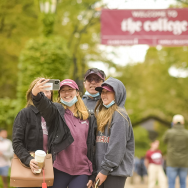“Life is not linear; if it were, there would be nothing to discover,” Assoc. Prof. Kimberly Kay Hoang told new University of Chicago undergraduates Thursday evening.
An award-winning sociologist, Hoang was delivering the Aims of Education address, an annual event that offers students the chance to hear a distinguished faculty member reflect on the purpose of their College education. “If you take this journey of self-discovery seriously,” she said, “you will pave your own path that brings all of your unique interests together.”
Now in its 60th year, the Aims of Education address is an Orientation Week tradition that welcomes first-year students into UChicago’s intellectual community. Hoang delivered this year’s address in Rockefeller Memorial Chapel before a small group of students, with many more watching a live webcast from their residential houses.
A recipient of the Quantrell Award for Excellence in Undergraduate Teaching, Hoang drew on stories from her own experience in academia—from student to researcher to faculty member. Her address focused on three forms of discovery that await students entering the College: self, social and scientific discovery.
“This is a time when you get to strip away parts of who you were raised to be by your parents, extended family members, community members and really ask yourself: Who do you want to be?” Hoang said. “What matters to you? What keeps you up at night? What are you called upon to do with your unique gifts in this world?”
Hoang’s own answer to these questions was informed by her background as a first-generation college student and a daughter of Vietnamese refugees. Raised in a community she described as “extremely patriarchal,” Hoang was discouraged from pursuing higher education as it was seen as jeopardizing her chance at having a family.
In time, however, Hoang went on to not only receive her Ph.D. and start a family, but also conduct intensive ethnographic research on sex work in Vietnam. Her research challenged common perceptions of the social and economic position of sex workers; those ideas, Hoang said, faced early resistance among the academic community.
“The data, the evidence, had to speak for itself. Anything short of that would be a disservice to my research subjects and a failure to advance knowledge in the social sciences,” she said. “As I reflect on my own journey of scientific discovery, I realize that this aligns with UChicago’s tradition of confronting uncomfortable insights.”
Hoang emphasized that research and inquiry can be deeply influenced by the relationships that students in the Class of 2025 will develop with their peers.
“When we think about intelligence, discovery or innovation, we often think about the stereotypical person wandering the forest in deep thought contemplating the meaning of life—only to find discovery like being hit by a lightning bolt,” Hoang said. “From a sociological perspective, the world doesn’t quite work that way. … At the University of Chicago, your journey of social discovery is bound to be relational. You will learn from the intimate and impassioned debates and conversations with classmates, especially in our Core curriculum.”
This type of social discovery, she added, is also rooted in joy: “The truth is, some of my most creative and innovative work has come from finding fun and joy in community with other people on the journey of discovery.”
That realization has prompted Hoang to interrogate the idea of great work and brilliant ideas as the product of drudge and toil: “It is so important for you to discover what brings you joy, and to use that as a guide as you move forward on your path of social discovery.”
With the return of students to campus, Hoang looks forward to the connections and conversations the UChicago community can have this year.
“As a small campus, the magic of this place comes from the intellectual firepower that is only possible when we are gathered in person,” she said. “The energy, curiosity and diverse perspectives that you contribute bring this place to life.”
Following the address, students joined their residential houses for colloquia with UChicago faculty members, an opportunity to engage in an intimate intellectual conversation much like Hoang described in her address.
One colloquium took place in the Cloister Club of Ida Noyes Hall, a building rich with history of generations of scholars. John W. Boyer, dean of the College, hosted the event for members of Snell-Hitchcock house, marking the start of a lively first year of their education at UChicago.
Boyer, who has served as dean since 1992, emphasized the value of the Aims of Education tradition. Over the course of an hour, he reiterated the main points of Hoang’s speech, then encouraged students to consider how those themes intersected with their own experiences.
“These are the types of conversations you can expect to encounter, and really to celebrate, during your time here in the College,” Boyer said.
